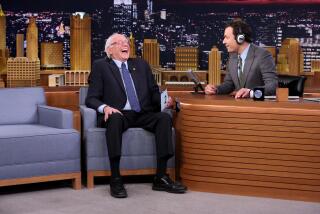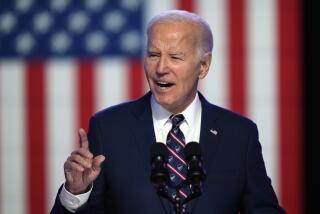Nader Enters Race as an Independent
- Share via
WASHINGTON — Corporate critic Ralph Nader announced Sunday he would make a fourth run for the White House, this time as an independent, four years after his populist Green Party bid helped tip the presidency to George W. Bush.
Decrying “a democracy gap” that he said had left “too much power and wealth in too few hands,” Nader said his candidacy would offer an alternative to Republicans and Democrats but would focus on ousting the incumbent.
“We need more civic and political energies inside the campaign to challenge this two-party duopoly,” Nader said in an interview televised on NBC’s “Meet the Press.”
With his declaration, Nader dealt a wild card into the 2004 campaign that leading Democrats had hoped to avoid just as the party was coming close to coalescing around a nominee -- the front-runner, John F. Kerry, or the underdog, John Edwards.
Staking out territory well to the left of the leading Democratic contenders, Sens. Kerry of Massachusetts and Edwards of North Carolina, Nader inveighed against the U.S. invasion and occupation of Iraq and said a strong case could be made for President Bush’s impeachment on the issue of whether the president misled the nation about the threat posed by former Iraqi President Saddam Hussein.
Kerry and Edwards voted to support the use of force against Iraq but have criticized Bush’s handling of diplomacy before the invasion and his stewardship of the occupied country afterward.
On domestic issues, Nader said he would repeal all of Bush’s tax cuts and indicated he would support gay marriage. Kerry and Edwards would raise rates only for the wealthiest taxpayers; neither Democrat supports same-sex marriage.
Kerry and Edwards have launched populist attacks against the Bush administration, using critiques of Wall Street, special interests, American dependence on foreign oil and corporate tax breaks that might overlap with the themes of a Nader candidacy.
But Nader spoke passionately of his belief that corporate influence in Washington is so pervasive that a major shake-up is needed.
“Washington is corporate-occupied territory, and the two parties are ferociously competing to see who’s going to go to the White House and take orders from their corporate paymasters,” he said. “So they may be different in their mind, they may be different in their attention, they may be different in their rhetoric. But in the actual performance, these corporate interests and their political allies are taking America down.”
Without the Green Party’s help, Nader will face a steep climb just to get his name on the ballot in many states. What’s more, many voters who oppose Bush this year -- especially those participating in Democratic caucuses and primaries -- say they will do whatever it takes to defeat him.
Their “anybody but Bush” fervor would make it harder for a left-leaning third-party candidate such as Nader or someone else the Greens may nominate at an upcoming national convention to siphon any support from a Democratic nominee.
Still, even if he draws fewer votes than he did as a Green in 2000, Nader could play a significant role this year.
The importance of his decision was underscored by the pleas many Democrats and other anti-Bush groups made for him to stay on the sidelines. Democratic National Committee Chairman Terry McAuliffe said Sunday he had appealed to Nader directly over lunch.
“It’s very unfortunate that Ralph decided to run. You know, he’s had a whole distinguished career fighting for working families,” McAuliffe said on CBS’ “Face the Nation.” “And I would hate to see, you know, part of his legacy being that he got us eight years of George Bush. So I’m disappointed.”
Republican National Committee Chairman Ed Gillespie, appearing with McAuliffe, said Nader’s candidacy wouldn’t matter.
“The fact is that if Ralph Nader runs, President Bush is going to be reelected,” Gillespie said. “And if Ralph Nader doesn’t run, President Bush is going to be reelected. “
Without doubt, Nader did matter in 2000.
Running to the left of Democratic presidential nominee Al Gore that year, Nader drew more than 97,000 votes in Florida and more than 22,000 in New Hampshire.
Had Gore taken a sliver of Nader’s Florida vote or a third of his New Hampshire vote, he would have beaten Bush. The Republican lost the popular vote nationwide but won the presidency with 271 electoral votes to Gore’s 266.
Nader’s effect was felt in more than just those two states.
Taking 2.7% of the national popular vote -- nearly four times the percentage he drew in his second run in 1996 -- Nader pulled enough votes in Oregon, Wisconsin, New Mexico and Iowa to make the contests in those states so close that Gore carried them all by less than a percentage point.
Nader also took more than 5% of the vote in Minnesota, projected to be another 2004 battleground. He took more than 3.8% of the vote in California.
“Clearly, it’s not going to help us” to have him run as an independent again this year, Gov. Bill Richardson of New Mexico, chairman of the Democratic National Convention, said of Nader’s candidacy on “Fox News Sunday.”
“I think he’s not going to have a sizable impact, but it’s terrible if he goes ahead, because it’s about him; it’s about his ego; it’s about his vanity.”
Nader dismissed such criticism as the baseless fears of a “liberal intelligentsia.” He has argued that Gore’s loss was Gore’s fault, not his.
To say he should not run, Nader said Sunday, “is a contemptuous statement against democracy, against freedom, against more voices and choices for the American people.”
Nader acknowledged he would face difficulty getting onto ballots in various states, many of which have stringent signature requirements and other hurdles for candidates other than Republicans or Democrats.
“There’s a tremendous bias in state laws against third parties and independent candidates, bred by the two major parties, who passed these laws,” Nader said. “They don’t like competition. So it’s like climbing a cliff with a slippery rope.”
Nader, who turns 70 on Friday, became nationally known in the 1960s as a consumer advocate who crusaded for auto safety standards. He has founded and aided numerous causes and advocacy groups over his career, most of them critical of corporate America and its ties to Republican and Democratic leaders in Washington.
He has kept homes in recent years in Washington, D.C., and Connecticut.
After running briefly as a write-in candidate in the 1992 Democratic primary in New Hampshire, Nader teamed up with the Greens in 1996 and 2000. The latter two campaigns boosted a party that has sought to be more than a fringe player.
Though many of his admirers this year were urging him to stand aside, the Green Party said Sunday it would welcome Nader into the race even as the party searched for its own nominee. Among seven announced contenders for the Green nomination is Peter Camejo, who ran for California governor in last year’s recall election.
Ben Manski, co-chairman of the national Green Party, said in a statement that the party would not support an independent.
“To move closer to achieving our goal, we run and support Green candidates,” he said.
The two leading contenders for the Democratic nomination, heading toward a showdown in California and nine other states that hold primaries and caucuses on March 2, acknowledged the Nader challenge.
“If I’m at the top of the ticket, I think I naturally appeal to a lot of the people who might find Ralph Nader appealing, because of my history of fighting for the little guy,” Edwards told reporters aboard his campaign plane between Youngstown, Ohio, and Rochester, N.Y.
In Atlanta, Kerry said he would win over Nader sympathizers. That coalition-building task bedeviled Gore throughout the 2000 campaign.
“I’m going to appeal to everybody in this race, and we’ll make it unnecessary, in the end, for an alternative,” Kerry told reporters Sunday morning as he left a church service.
In Los Angeles, the Rev. Al Sharpton of New York -- who, with Rep. Dennis J. Kucinich, is one of the two remaining longshots in the Democratic field -- also weighed in against Nader.
Preaching at First African Methodist Episcopal Church in the West Adams neighborhood, Sharpton described Nader as “on an ego trip or a Bush mission” and pledged to oppose him. He said Nader “has a right to be heard, when there’s something that has not been said.”
But Sharpton contended that Nader would plug no hole in the debate among anti-Bush forces.
*
(BEGIN TEXT OF INFOBOX)
Ralph Nader
* Age: 69; born Feb. 27, 1934.
* Hometown: Winsted, Conn.
* Family: Never married. Son of Lebanese immigrants, Nadra and Rose.
* Education: Graduated magna cum laude from Princeton University, 1955. Harvard Law School, 1958.
* Experience: Attorney, Hartford, Conn., 1959. Founder of numerous consumer groups, including Public Citizen, Public Interest Research Group, Center for Auto Safety, Clean Water Action Project, Disability Rights Center, Project for Corporate Responsibility and Center for the Study of Responsive Law. Author of “Unsafe at Any Speed,” 1965; “The Lemon Book,” 1980; “The Big Boys,” 1986; “Winning the Insurance Game,” 1990; and “The Case Against Free Trade: GATT, NAFTA and the Globalization of Corporate Power,” 1993. Green Party presidential candidate, 1996 and 2000.
Source: Associated Press
*
(BEGIN TEXT OF INFOBOX)
The Nader factor
Running to the left of Democratic nominee Al Gore in the 2000 presidential election, Green Party candidate Ralph Nader played a significant role in the historically tight outcome between Gore and George W. Bush. Had Gore taken a sliver of Nader’s vote in Florida, he would have beaten Bush. Bush lost the popular vote nationwide but won the presidency with 271 electoral votes to Gore’s 266.
*
2000 presidential election
*--* Electoral votes Vote % Votes Bush 271 48% 50,456,002 Gore 266 48% 50,999,897 Nader 0 3% 2,882,955
*--*
The effect in some key states
Vote totals and percentage of vote, with the number of electoral votes in 2000.
*
Florida (25 electoral votes)
*--* Votes Vote% Bush 2,912,790 49% Gore 2,912,253 49% Nader 97,488 2%
*--*
Iowa (7 electoral votes)
*--* Votes Vote% Bush 634,373 48% Gore 638,517 49% Nader 29,374 2%
*--*
New Hampshire (4 electoral votes)
*--* Votes Vote% Bush 273,559 48% Gore 266,348 47% Nader 22,198 4%
*--*
New Mexico (5 electoral votes)
*--* Votes Vote% Bush 286,417 48% Gore 286,783 48% Nader 21,251 4%
*--*
Oregon (7 electoral votes)
*--* Votes Vote% Bush 713,577 47% Gore 720,342 47% Nader 77,357 5%
*--*
Wisconsin (11 electoral votes)
*--* Votes Vote% Bush 1,237,279 48% Gore 1,242,987 48% Nader 94,070 4%
*--*
*
Sources: Times research, Federal Election Commission
*
Times staff writers Matea Gold, Janet Hook, Scott Martelle and Susannah Rosenblatt contributed to this report.
More to Read
Get the L.A. Times Politics newsletter
Deeply reported insights into legislation, politics and policy from Sacramento, Washington and beyond. In your inbox twice per week.
You may occasionally receive promotional content from the Los Angeles Times.










